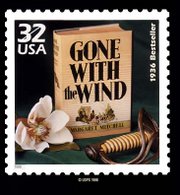Gone with the Wind
Gone with the Wind, an American novel by Margaret Mitchell, was published in 1936 and won the Pulitzer Prize in 1937. more...
The novel is one of the most popular of all time, and an American film adaptation of the same name released in 1939 became the highest-grossing film in the history of Hollywood and received a record-breaking number of Academy Awards.
Mitchell's work relates the story of a rebellious Georgia woman named Scarlett O'Hara and her travails with friends, family and lovers in the midst of the antebellum South, the American Civil War, and the Reconstruction period. It also tells the story of the love that blossoms between Scarlett O'Hara and Rhett Butler.
The title is taken from the first line of the third stanza of the poem Non sum qualis eram bonae sub regno Cynarae by Ernest Dowson: "I have forgot much, Cynara! gone with the wind." Alternatively, the line also appears in the novel. When Scarlett escapes Atlanta's bombing by the forces of the north, she flees back to her family's plantation, Tara. At one point, she wonders "Was Tara still standing? Or was Tara also gone with the wind which had swept through Georgia?"
Critics and historians regard the book as having a strong ideological commitment to the cause of the Confederacy and a romanticized view of the culture of the antebellum South. This is apparent from the book's opening pages, which describe how Scarlett's beaus, the Tarleton twins, have been expelled from university and are accompanied home by their elder brothers out of a sense of honor: a metaphor for the South's viewpoint on the statehood of Kansas.
Nevertheless, the book includes a vivid description of the fall of Atlanta in 1864 and the devastation of war (some of it absent from the 1939 film), and shows a considerable amount of historical research. Mitchell's sweeping narrative of war and loss helped the book win the Pulitzer Prize on May 3, 1937.
Alexandra Ripley wrote the novel Scarlett, in 1991, as the authorized sequel to Mitchell's novel.
In 2000, the copyright holders attempted to suppress publication of Alice Randall's The Wind Done Gone, a book that retold the story from the point of view of the slaves. A federal appeals court denied the plaintiffs an injunction against publication in Suntrust v. Houghton Mifflin (2001), on the basis that the book was parody protected by the First Amendment. The parties subsequently settled out of court to allow the book to be published.
Structure
Part One
Chapters I to VII
From Tara to Ashley's birthday barbecue where his engagement to Melanie is announced and Fort Sumter spurs the beginnings of the American Civil War.
Part Two
Chapters VIII to XVI
From Tara to Scarlett's early years of the war in Atlanta with Aunt Pitty and Melanie.
Read more at Wikipedia.org



